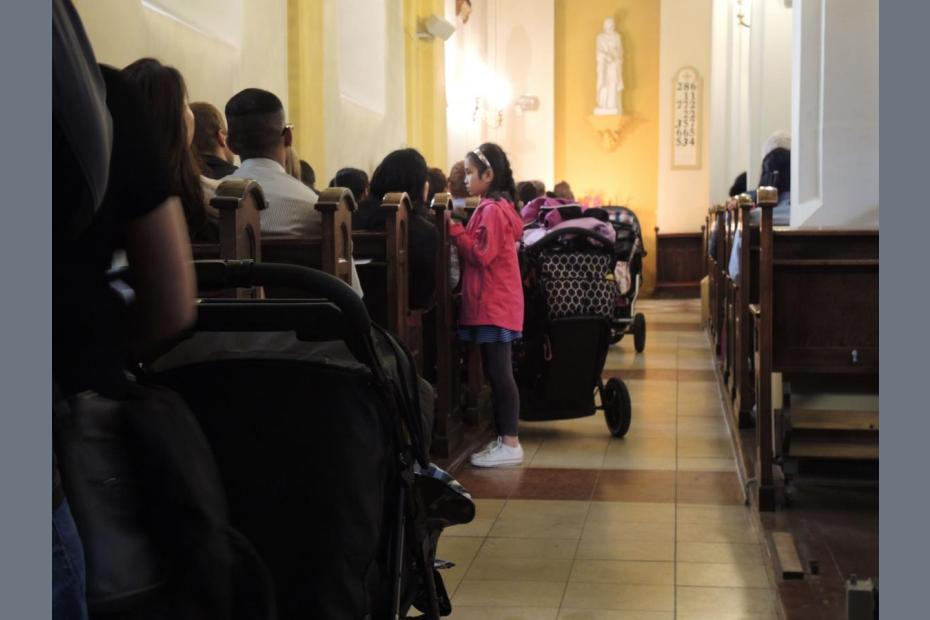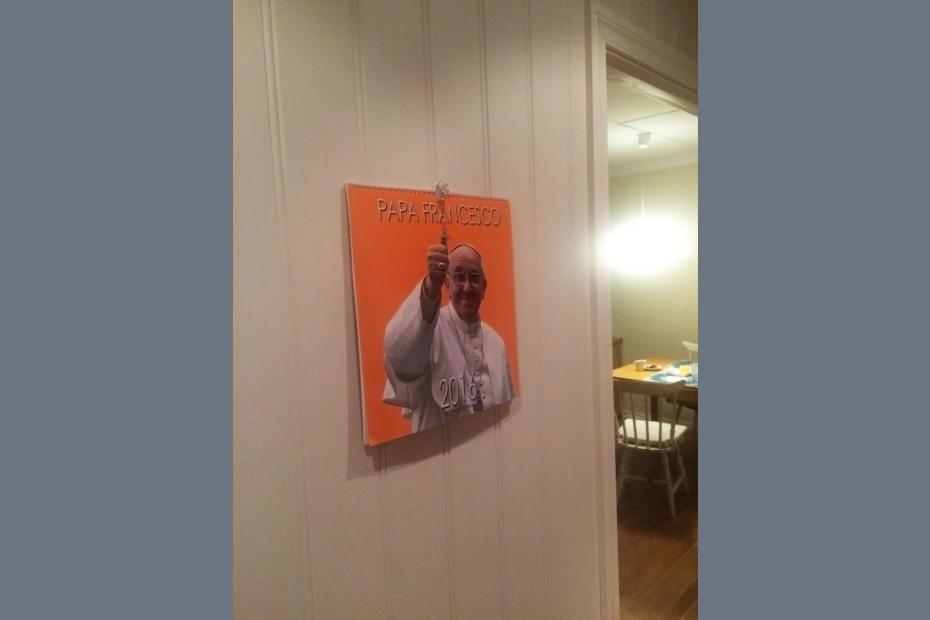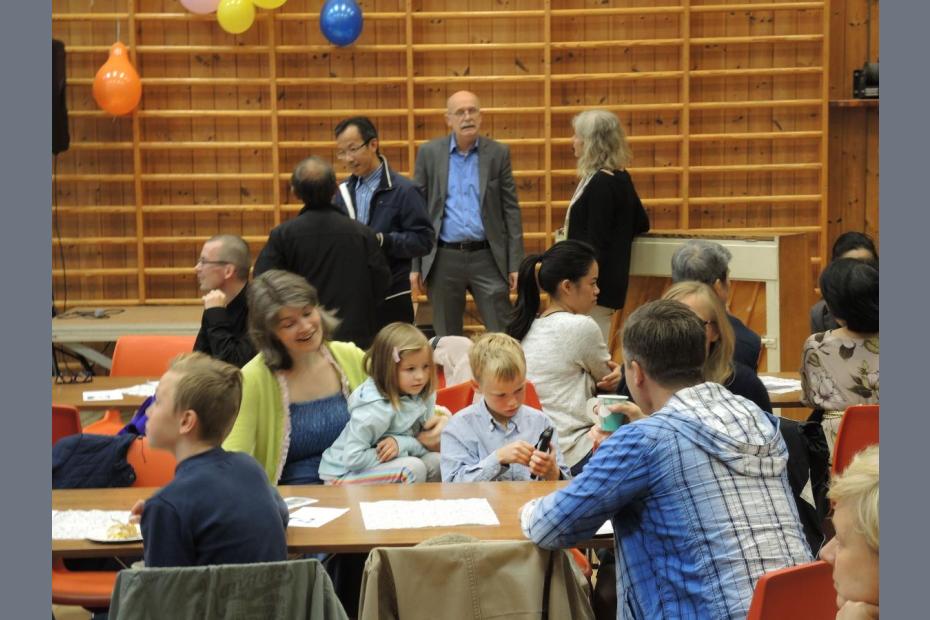Norwegians often laugh, and/or lament, that their countrymen find it much easier to talk openly about sex than religion. Some interviewees complained that sex was too much a part of daily discourse and media life, but it is interesting as well that at least in Bergen, a person who relied only on his or her eyes walking the streets would see no evidence of this. People dress quite modestly, and Bergen appears to have no red light district or even provocative public ads. Bergen looks like a very modest, sober city.
Still, matters relating to family, sexual norms and gender serve to some degree as challenges or marks of differentiation when Catholics speak of their relationship to Norwegian culture. Catholics interviewed in Bergen lamented the prevalence of divorce in the country, though some were themselves divorced. Immigrants among them spoke of a variety of adjustments that they faced (or valued) in light of Norwegian gender norms. Yet even those who sought to distance themselves from some Norwegian family and gender norms never spoke in terms of culture wars. One Mexican-born Catholic said that she was struck how much Norwegians welcomed and prioritized children, more than other countries she knew in Europe. Indeed, by many measures of educational and social wellbeing, children are quite well cared for in Norway.
National statistics offer a few basic measures of family life. Almost one in five Norwegians lives alone.1 One in four adult couples (and 39 percent of 25-29 year-olds) is not married.2 The average age at first marriage has increased from around 25 for men and 23 for women in 1974 to around 34 for men and 32 for women in 2014.3 The percentage of persons between ages 20 and 34 who are married is the fifth lowest among industrialized countries.4 Just over 40 percent of marriages end in divorce, a ratio slightly below the European average.5 75 percent of children (88 percent of one year-olds, 61 percent of 17 year-olds) live with both parents.6
There seems to be no survey data to indicate whether Catholics are more or less likely to be divorced, or to think differently about sexual or family matters. Most of what can be said here is dependent on a relatively small number of interviewees.7 Still, they yielded some interesting observations.
Involvement in church life in Bergen is, by most accounts, very clearly impacted by people’s family status at a given phase of life. Young people tended to be active in the parish up until age 18, but many interviewees spoke about the difficulty of engaging them in church life from 18-30, at least until they became parents themselves. The parish runs schools and many activities for young people, but young people were also pulled away from church practice by peers. Parents spoke of insisting that their children attend and be involved in church through high school, but having to let them make their own decisions after that. Some noted that this was a struggle they faced in Norway even for younger children, though in their native countries, such as the Philippines, they would have had much more cultural latitude to insist that their children practice the faith. Polish youth may be an exception. One Polish priest said that he found it easier to organize young adults in Bergen than in Poland, because they were looking for places to meet Polish peers.
Immigrant Poles, Lithuanians, and Vietnamese typically marry within their own ethnic groups, or arrive as couples. Filipinas, and many other immigrants, tend to be married to non-Catholic Norwegians. Family life, therefore, was often a negotiation between their own norms as Catholics and natives of other places, and a non-believing or Protestant husband’s Norwegian norms. This sometimes led to small tensions over religious upbringing. One spoke of minor conflicts, as when catechism “got in the way” of study time from her husband’s perspective. But she still said that her children were receptive to her efforts to raise them Catholic.
Marriage was an important topic of discussion, in part because of expressed discomfort over “homophile,” or same-sex, marriage, but also because people said they wished for a deeper understanding of marriage than they found in their culture. Even though some said that they found the Church’s conception of marriage to be too idealized or rigid, interviewees repeatedly said that even if divorce is sometimes necessary, most people “give up too easily” on marriages.
Along with concern over abortion policy, the question of same-sex marriage seems to have been the one big issue that set Catholics apart from other Norwegians. Among those interviewed, none supported same-sex marriage within the Church, though some said that it was a secular matter that Catholics should accept as such and move on. “Let the government do what has been decided… Is it okay, or not? It’s legal. That train has left the station. It’s the price of democracy. But it doesn’t mean I believe in it in the church.” Conversations in the Church of Norway to bless same-sex marriages did seem to be a factor in pushing some converts away from that church.
Few people talked of matters like contraception unless asked, though some older members found the Church’s teaching in Humanae Vitae to be problematic. While there were many baby carriages and small children at some of the Masses, no one seemed to have more than one or two children. One Catholic suggested, “contraception is seen here as a conversation to have with doctors, not with priests.”
It is worth noting that while Catholics perceived themselves as more conservative than other Norwegians on sexual and family matters, “Most Catholics are conservative when they talk about values, but they are not neo-liberals.” Though market-oriented and libertarian conservatism was becoming more influential in conservative circles, “conservative” for them meant responsibility and family, not surrendering to market domination.
Gender roles and norms in a Norwegian context
Perhaps the most interesting cultural challenges arose not over hot-button issues relating to sexuality and divorce, but over subtler, yet important differences in the gender codes of Norwegians. In these regards, interviewees admired many aspects of Norwegian culture, though it also posed challenges for some.
Interestingly, the Catholic Church’s prohibition of women’s ordination seemed not to be a significant issue for men or women interviewed, even though all were accustomed to, and comfortable with, women ministers in the Church of Norway. No one who had converted, or been a part of convert classes, had heard of an instance in Bergen where escape to an all-male clergy was a factor in someone’s conversion to Catholicism, though one interviewee said that there was more of a movement for women’s ordination in Oslo.8
One Mexican woman valued the expectation that women work, and connected it to a cultural insistence that children take more responsibility for themselves in the household, so that women were not expected to do everything for their children. Fathers, too, she saw, not only contributed more to household duties, but also were much more likely to become involved in the community, to volunteer, to be at children’s football matches.
Several women agreed that the immigrant experience varied significantly for men and women. Several recounted examples of women they know who had come from other countries — notably Tamils, Eritreans and Poles, but not only them — and were, over time, happy to see the kinds of freedoms, financial independence, and more equitable division of household and parenting responsibilities that are the norm in Norway, and often pushed for some shift to the same norms in their own homes. Norwegian women at work would ask them why they put up with husbands not sharing the work. “I want to be like a Norwegian woman. I want to have a credit card and some freedom” these women were reported to have said. Their husbands, however, were said to be much more resistant to changing gender norms and saw them as a cultural threat.
One fairly young Polish Catholic man who was in many ways appreciative of Norwegian freedom and critical of some aspects of Polish culture in comparison, nonetheless worried that in the Norwegian context, “men are losing their confidence. Men should be stronger in decisions, now they are becoming more like ‘maybe, maybe,’ and this is the worst thing that could happen. They are becoming more female in how they behave, and that’s what I don’t like. It’s an example about what I don’t like about marriage [here]… There are a lot of reasons why this is happening, but it’s because everyone wants to make life easier and forgetting the simple rules about how to live.”
Interviewees also suggested that migration was having an effect on family life and roles for reasons that had little to do with cultural norms in Norway. Significant numbers of Polish men, and a smaller number of Lithuanian men, migrate temporarily without their wives and children. In some cases, interviewees were aware of, in the absence of their husbands at home, women begin to appreciate their own ability to lead the household and don’t take well to men who return from abroad and want to wholly assert their authority. Poles were often from rural villages and conservative parts of the culture, and come to see “what it’s like to live where women have greater support. You can manage financially without a man, and don’t need his support.”
Men had more difficulty seeing why things should change for them in terms of family responsibilities just because they move to Norway, interviewees reported. Men “don’t understand that they should change to keep their women, do more house chores and don’t go fishing with your mates, and be more involved with their children. Because that’s expected of men to be with their children in this culture. If you go to football matches, all the fathers are there for their children.”
- 1Statistics Norway, https://www.ssb.no/en/befolkning/statistikker/fobhushold as of 2011. Accessed March 5, 2016.
- 2Statistics Norway, https://www.ssb.no/en/befolkning/statistikker/samboer Accessed March 5, 2016.
- 3Statistics Norway, https://www.ssb.no/en/befolkning/statistikker/ekteskap Accessed 5 March 2016.
- 4Organization for Economic Cooperation and Development, http://www.oecd.org/els/soc/SF3_3_Cohabitation_rate_and_prevalence_of_other_forms_of_partnership_Jan2013.pdf Accessed March 5, 2016.
- 5Statistics Norway, https://www.ssb.no/en/befolkning/statistikker/ekteskap, using the crude divorce rate for 2015. Accessed March 5, 2016.
- 6Statistics Norway, https://www.ssb.no/en/befolkning/statistikker/familie, as of 2014. Accessed March 5, 2016.
- 7The articles presented here are based primarily on interviews conducted in September 2015 in Bergen with 20 Catholics and one member of the Church of Norway. Interviewees were evenly split between men and women. Fourteen were immigrants, and six were native Norwegians. Most Catholic interviewees were very active in the parish.
- 8It may well be, of course, that people who are less happy about this issue are less likely to have been interviewed.



